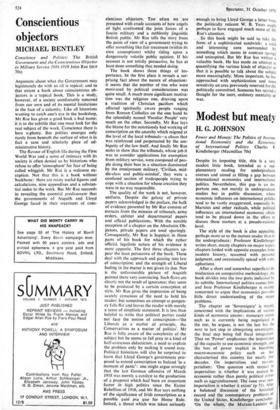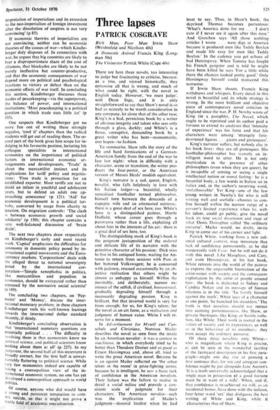Modest but meaty
H. G. JOHNSON
Power and Money: The Politics of Interne. tional Economics and the Economies of International Politics Charles P. Kindleberger (Macmillan 70s) Despite its imposing title, this is a very modest little book, intended as a sup- plementary reading for undergraduate courses and aimed at filling a gap between international economics and international politics. Nevertheless, this gap is an ho.
portant one, not merely in undergraduate studies but in public discussion, where economic influences on international politics tend to be vastly exaggerated, especially by Marxists and other radicals, while political influences on international economic affairs tend to be played down in the effort to discuss these matters at a pseudo-rational level.
The style of the book is also appealing. perhaps more so to the mature reader than to
the undergraduate: Professor Kindleberger
writes short, meaty chapters on major topics, chapters larded with apposite examples from modern history, seasoned with personal judgment, and occasionally spiced with witty aphorisms.
After a short and somewhat superficial in- troduction on comparative methodology. the book divides into the two parts indicated by
its subtitle. International politics comes first: and here Professor Kindleberger is mainly concerned to argue that economics provides little direct understanding of the major problems.
The chapter on 'Sovereignty' is mainly concerned with the implications of various
kinds of economic unions: monetary union.
such as is currently being negotiated in the E.E.c, he argues, is not the last but the next to last step in abnegating sovereignty. the final step being full fiscal integration. That on 'Power' emphasises the importanct of the capacity to use economic strength. ark the loss of power implicit in bumbling macro-economic policy such as characterised this country for nearly two decades. On imperialism and neo-im perialism: 'One question with respect le imperialism is whether it was caused b% economic rather than purely political drive, such as aggrandisement. The issue over neo- imperialism is whether it exists' (p 71). After a balanced discussion of the historical record and the contemporary problems of the United States, Kindleberger concludes : 'On the whole, the Marxist-Leninist In' terpretation of imperialism and its extension to the neo-imperialism of foreign investment after the dissolution of empires is not very convincing' (p 85).
If economic theories of imperialism are not convincing, neither can be economic theories of the causes of war—which Kindle- berger duly disposes of. In connection with war, he argues that big countries are likely to bear a disproportionate share of the cost of alliances, that blockades are likely to be not merely ineffective but counter-productive, and that the economic consequences of war depend more on political and psychological reactions to victory or defeat than on the economic effects of war itself. In concluding this section, Kindleberger discusses three modes of peacekeeping—via the superpower, the balance of power, and international institutions; 'Most peacekeeping is a political question in which trade cuts little ice' (p 105).
One suspects that Kindleberger got no more fun out of writing these strongly negative, 'cool it' chapters than the radical students will get out of reading them. The se- cond part of the book gives him scope for in- dulging in his favourite pastime, lecturing his colleague specialists in international economics on the importance of political factors in international economic ar- rangements and developments. 'Trade' is about the mercantilist instinct and its implications for tariff policy and negotia- tions: 'Free trade is protection for an established exporter. Most tariffs are not to shield an infant in youthful and adolescent years, but to defend an adult one ap- proaching senescence' (p 121). 'Aid' for economic development is a political tar- baby, converted by usage from charity to taxation. On migration controls: 'The clash is between economic growth and social solidarity' (p 150); this chapter contains a very well-balanced discussion of 'brain drain'.
The next two chapters draw respectively on Kindleberger's early and most recent work. 'Capital' emphasises the difficulties for autonomy in domestic policy posed by in- ternational capital movements and the Euro- currency markets. 'Corporations' deals with the alleged threat to national sovereignty posed by the international cor- poration—'Simple xenophobia in politics, like mercantilism and populism in economics, should be extirpated rather than appeased by the normative social scientist' (p 189).
The concluding two chapters, on 'Pay- ments' and 'Money', discuss the inter- national monetary problem; in these chapters Kindleberger veils his well-known leanings towards the international dollar standard decently, if thinly.
Kindleberger's concluding observation is that 'international monetary questions are
essentially political . . . The difficulty in resolving them is that economists know no political science, and political scientists know nothing about them at all' (p 227). In my Judgment, the second half of this statement is
broadly correct, but the first half is unwar- rantably flattering to political science. While Very few economists indeed are capable of taking a cosmopolitan view of the in-
ternational economic system, no one has yet developed a cosmopolitan approach to world politics.
Of course, anyone who did would have a strong and persistent temptation to com- mit suicide, so that it might not prove a viable field of academic specialisation.











































 Previous page
Previous page